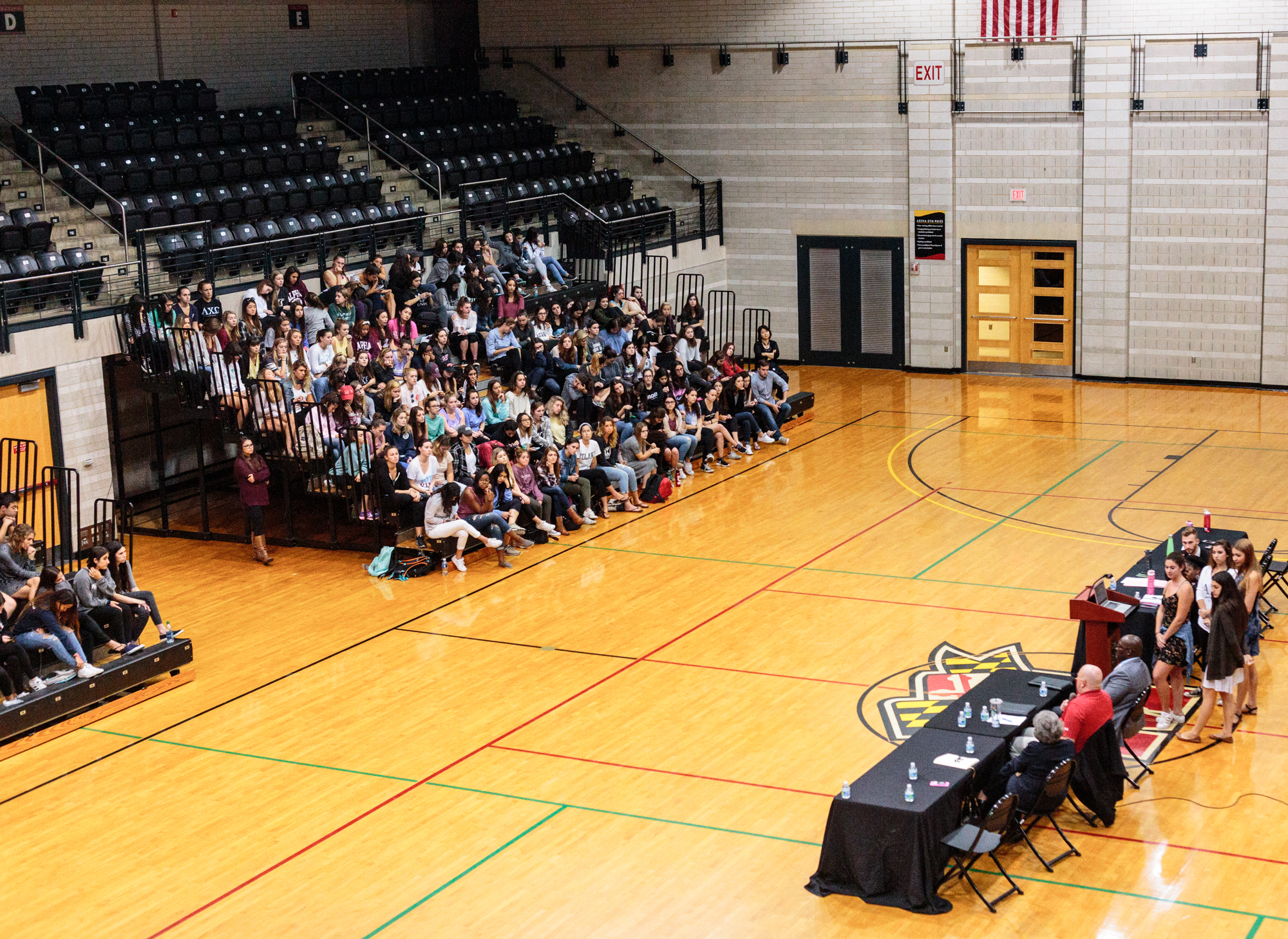Three University of Maryland sororities hosted a panel Friday to raise awareness about sexual assault and to educate students about what could happen in the aftermath of a sexual assault.
Event coordinators from Phi Sigma Sigma, Sigma Delta Tau and Alpha Chi Omega coordinated and introduced the five-person panel to an audience of more than 100 students in the Ritchie Coliseum gymnasium to talk about the issue.
The panel included Cheryl Banks, an advocate from Domestic Violence and Sexual Assault Center at Dimensions Healthcare System, Dr. Rashanta Bledman, a clinical psychologist from the university’s counseling center, Josh Bronson, the assistant director of the Office of Civil Rights & Sexual Misconduct and a Title IX investigator, Lt. Raphael Moss from University of Maryland Police, and J.T. Stanley, a student senator who built his platform on sexual assault reforms.
Molly Higgins, a junior psychology major and event coordinator, said there’s a need to fill in knowledge gaps about what happens after a sexual assault, for instance what a rape kit is like and how long investigations take.
“The panel is based around the idea that there’s been a lot of events on campus that are raising awareness, but there’s a lot of people who don’t really know what to do if they actually are assaulted or if their friend is assaulted,” Higgins said.
Sexual assault is an epidemic on campuses nationwide, with one in five women self-reporting experiencing a sexual assault while in college, according to a 2007 study by the National Criminal Justice Reference Service.
“You couldn’t walk down McKeldin Mall without someone in your field of vision who isn’t a survivor,” said panel-member J.T. Stanley, a senior individual studies major.
Higgins said one of the most important panel speakers was Cheryl Banks, an advocate from the Domestic Violence and Sexual Assault Center at Dimensions Healthcare System. Banks has administered rape kits for almost 25 years, and she spoke to students about what to expect from the process.
“It’s just kind of an idea that’s foreign and odd and nobody really talks about,” Higgins said. “Most people on campus only know as much about rape kits as they’ve seen in an episode of Law and Order.”
First, patients are given a physical exam to check for injuries, Banks said. A nurse then takes the patient’s statement before using large Q-tips to swab over the whole body for evidence, which usually takes around 30 to 45 minutes — a “very invasive” experience, she added.
Patients do not need to press charges at the time of the exam, Banks added, and can have their rape kits stored anonymously until they decide if they want to go to the police.
Josh Bronson, the assistant director of the Office of Civil Rights & Sexual Misconduct and a Title IX investigator, said the majority of victims choose not to launch an investigation.
“Justice looks like a lot of different things to a lot of different people,” Bronson added.
Dr. Rashanta Bledman, a counselor at the university counseling center, said she tells her patients they do not have to tell their story if they don’t want to and “they have control over what they share and who they share that information with.”
If a sexual assault survivor does decide to share their story, their family and friends’ reactions are extremely important, Bledman said. It’s important to think about what that person needs while they’re sharing extremely “personal and intimate information.”
There is no normal reaction to sexual assault, Bledman added.
“You can’t really decide how you respond to trauma,” Bledman said. “You were trying to survive, and this is what your body chose to do to survive.”
Students can report sexual assault to the Office of Civil Rights & Sexual Misconduct and to the University of Maryland Police Department. They can also seek counseling at the university’s counseling center in Shoemaker Hall, which offers emergency consultations.



